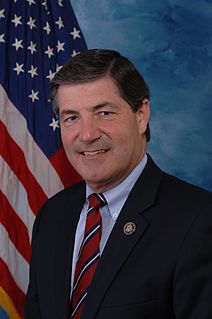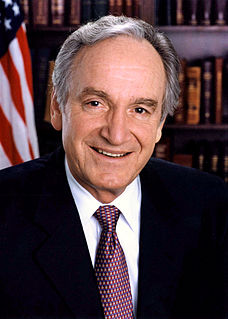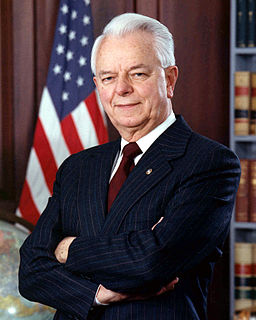A Quote by Barton Gellman
At the height of Iraq's clandestine nuclear weapons program, which nearly succeeded in building a bomb in 1991, Tuwaitha incorporated research reactors, uranium mining and enrichment facilities, chemical engineering plants and an explosives fabrication center to build the device that detonates a nuclear core.
Related Quotes
The Iranians know that if they develop nuclear weapons, they will be in tremendous jeopardy from military capabilities of their neighbors and of the United States. I am not predicting what will happen in 2013, but I do think it is a crucial year. I hope we can make it clear to the Iranians that we do not object to them having peaceful use of nuclear power. But when they enrich Uranium to a 20 percent level, people think they are going for the bomb. Their uranium enrichment program is a real danger.
Terrorists do not actually need nuclear weapons. They have been conveniently supplied with 103 nuclear power plants scattered throughout the United States (438 of these deadly facilities exist throughout the world). A planned meltdown at one of these facilities would make the World Trade Center attacks seem like child's play. The massive concrete containers protecting the reactors are not strong enough to withstand the impact of a jumbo jet.
What is the only provocation that could bring about the use of nuclear weapons? Nuclear weapons. What is the priority target for nuclear weapons? Nuclear weapons. What is the only established defense against nuclear weapons? Nuclear weapons. How do we prevent the use of nuclear weapons? By threatening to use nuclear weapons. And we can't get rid of nuclear weapons, because of nuclear weapons. The intransigence, it seems, is a function of the weapons themselves.
The most dangerous thing Iraq could have ever had was a nuclear weapon. The nuclear weapon Iraq was trying to build was not deliverable by bomb or ballistic missile. It was a large, bulky device that they hoped to bury and set off to let the world know they had a nuclear weapon. They never achieved that.
I don't want to use the term "nuclear weapons" because those people in Iran who have authority say they are not building nuclear weapons. I make an appeal to the countries who do have nuclear weapons. They don't consider them a nuclear threat. But let's say a country that doesn't have nuclear weapons gets involved in building them, then they are told by those that already have nuclear weapons that they oppose [such a development]. Where is the justice in that?
Whereas Iraq has consistently breached its cease-fire agreement between Iraq and the United States, entered into on March 3, 1991, by failing to dismantle its weapons of mass destruction program, and refusing to permit monitoring and verification by United Nations inspections; Whereas Iraq has developed weapons of mass destruction, including chemical and biological capabilities, and has made positive progress toward developing nuclear weapons capabilities
Almost all of the governments have agreed that they will not acquire nuclear weapons and that they will allow the International Atomic Energy Agency to monitor their commercial and research nuclear power operations to ensure that nuclear materials - highly enriched uranium and plutonium - are not diverted to use in weapons.
The last UN weapons inspectors left Iraq in October of 1998. We are confident that Saddam Hussein retains some stockpiles of chemical and biological weapons, and that he has since embarked on a crash course to build up his chemical and biological warfare capabilities. Intelligence reports indicate that he is seeking nuclear weapons.
































